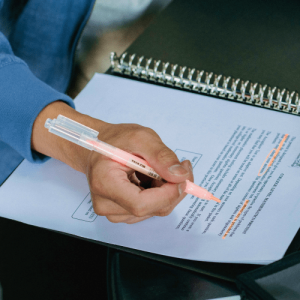
As the world’s leading English language test, doing well in your IELTS exam can be the gateway for a range of study, migration and work opportunities.
So, how to achieve your best possible IELTS score?
Whether you’re taking the Academic or General Training test, good preparation is essential. It’s also important to practice for all four parts of the test: reading, writing, speaking and listening.
By consulting the IELTS experts in our network – including colleagues with experience of successfully taking the IELTS test – we’ve put together our top ten tips of how to prepare for your IELTS exam.
1. Use a variety of English language resources
 It’s a good idea to regularly read books and magazines in English. Also, take time to watch and listen to English language films, videos and podcasts.
It’s a good idea to regularly read books and magazines in English. Also, take time to watch and listen to English language films, videos and podcasts.
Using a wide range of resources will develop your vocabulary across a variety of topics. The National Geographic, The Guardian and BBC podcasts are good places to start.
Slavomira Zittova, who took IELTS in the UK, says, “I built my vocabulary by reading books, specifically Harry Potter. I also watched movies and educational shows like TED.”
Knowing that the IELTS exam often involved topics such as the arts, travel, the environment, education and mass media, Slavomira looked out for these subjects in magazines.
Nazlin Nazir, who sat IELTS in India, says that finding engaging English content made learning more memorable. “I think the words that stuck with me are the ones I heard in celebrity interviews,” says Nazlin.
2. Know the IELTS test format
To avoid any surprises on exam day, invest time in getting to know the IELTS test format.
Zara Hassan, who sat the IELTS exam in Pakistan last year, says that becoming familiar with the test structure and the type of questions was important. For example, Zara felt better prepared for the listening test because she understood the recording would only be played once in the exam.
The British Council and IDP offer free online IELTS practice tests. Slavomira and Zara also recommend studying the sample questions in The Official Cambridge Guide to IELTS.
3. Read model answers
 When it comes to the writing section, model answers can give you a good idea of what is needed to do well.
When it comes to the writing section, model answers can give you a good idea of what is needed to do well.
IELTS publishes both General Test and Academic writing sample answers. These also show the examiner’s comments and will help you understand the features of high scoring responses.
4. Avoid making common mistakes
As with many exams, one common mistake IELTS candidates make is not reading or listening to the questions properly. Another issue is running out of time.
To overcome these problems, practice taking the test under timed conditions at home. Underlining key words in the question can help you stay focused when under pressure.
Zara explains she found it difficult to keep track of time in the reading test. “To overcome that, I read the questions first before the passage,” Zara says. “I highlighted the keywords in the passage to help me find the answers more quickly.”
Slavomira, on the other hand, preferred to scan the reading passage first before carefully reading the questions. She warns close attention is needed as “the answers in the reading test can look very similar.”
Whatever your preferred approach, it’s important to find what allows you to do your best on exam day.
 5. Record yourself
5. Record yourself
Practising for the speaking exam can be tricky. One good tactic is to record yourself answering some practice questions.
Listening to the recording back will help you spot if you’re hesitating or making other mistakes. “At the beginning, I paused a lot,” says Nazlin, “and I used to answer in just a sentence rather than elaborating.”
Nazlin also suggests practising with a friend or a tutor to improve fluency. Slavomira agrees, “I made topic flashcards and practised by speaking with my friend.”
6. Get feedback
Receiving feedback on your strengths and weaknesses from a trained English teacher can be invaluable. They will help you learn from your mistakes and develop your vocabulary and grammar knowledge.
Students often find it helpful to rewrite essays that have been corrected by a teacher, making a ‘fair copy’ with no errors. These can be read before going into the IELTS test to remind you of best practice and useful phrases.
7. Know your ‘problem’ words
We all have words that trip us up.
Make a note of words you often spell or pronounce incorrectly. Then, spend some time learning to get them right.
 8. Make the most of online IELTS resources
8. Make the most of online IELTS resources
There’s lots of helpful online IELTS resources, from YouTube videos and dedicated websites to IELTS expert Facebook sessions and the IELTS app.
Slavomira says, “It’s also nice to connect with people in IELTS chat rooms, where people share various tips and learn from each other.
9. Keep practising – especially the sections you find difficult
By practising all the different parts of the IELTS test, you’ll be able to go into the exam feeling well prepared. It will also help you spot your most common mistakes and correct them before the test.
“Anyone sitting the exam should keep practising, especially the areas where they don’t feel confident,” says Slavomira.
Zara agrees that regular practice was key to her doing well in the listening exam, “I used to practice daily to get used to different accents.”
10. Invest in an IELTS preparation course
Preparing for the IELTS test can feel overwhelming, especially when trying to understand the exam format and the scoring system.
That’s why many students choose to invest in an IELTS preparation course or tutor. Getting this expert support and guidance can be a valuable investment.
Ready to take your IELTS test? Find and book your most convenient IELTS test centre.
Feeling worried about your upcoming exam? Read our helpful guide to managing exam stress.



